NRSG 266: Evaluating Ginkgo Biloba for Cognitive Decline
VerifiedAdded on 2022/09/16
|8
|2036
|21
Literature Review
AI Summary
This paper reviews the existing literature on the efficacy of Ginkgo Biloba in treating cognitive impairment and Alzheimer's disease, focusing on studies that explore its impact on elderly adults. It discusses conflicting findings regarding Ginkgo Biloba's ability to reduce the risk of Alzheimer's progression, its potential benefits for mild dementia and cognitive impairment, and the importance of weight loss in elderly adults. While some studies suggest a positive impact on cognitive function, others indicate no significant reduction in Alzheimer's risk. The review acknowledges limitations such as attrition bias, sample bias, and the use of Ginkgo Biloba in combination with other ingredients. The author concludes that there is evidence supporting the use of Ginkgo Biloba for cognitive improvement, but further research is needed to fully understand its effects on Alzheimer's disease.
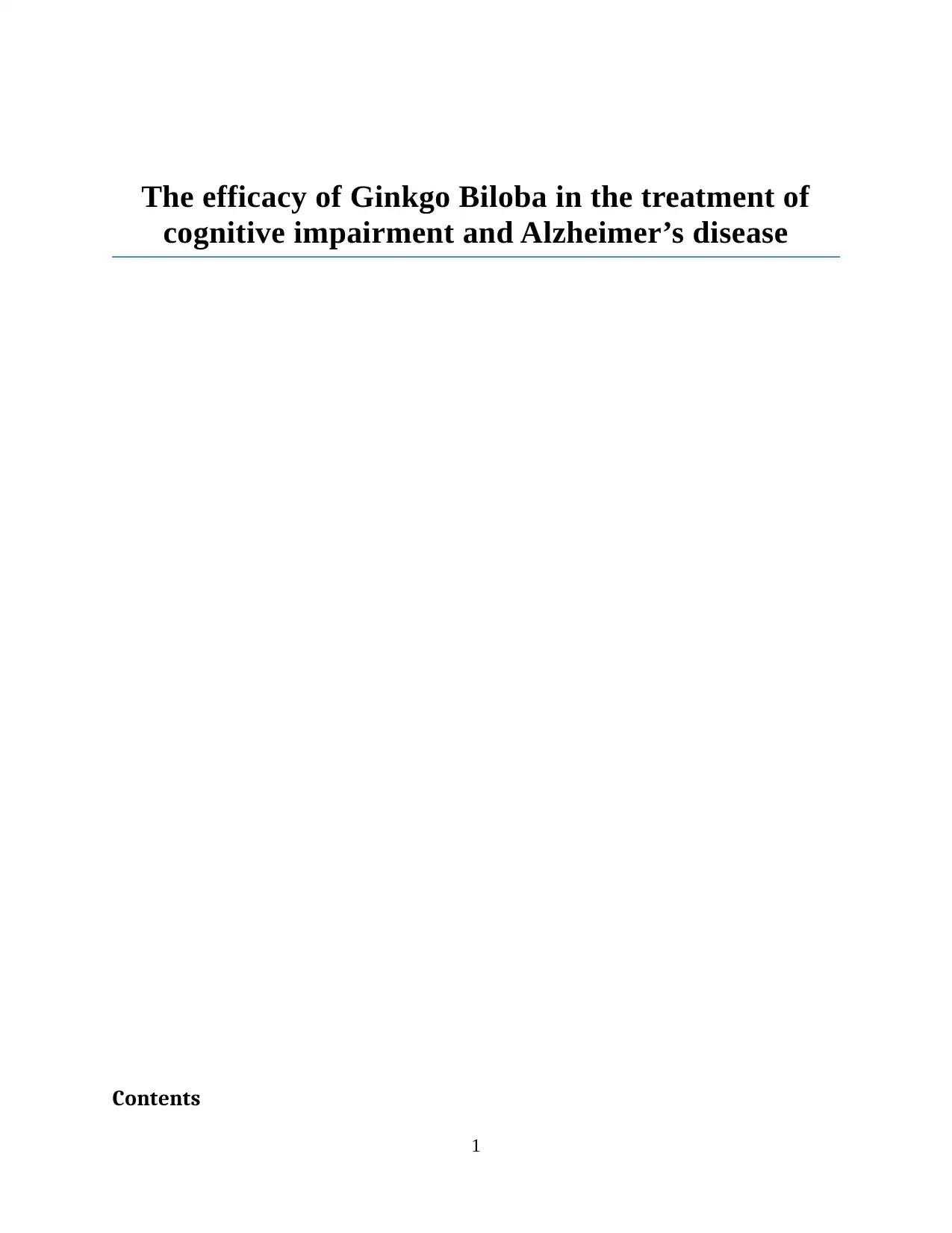
The efficacy of Ginkgo Biloba in the treatment of
cognitive impairment and Alzheimer’s disease
Contents
1
cognitive impairment and Alzheimer’s disease
Contents
1
Paraphrase This Document
Need a fresh take? Get an instant paraphrase of this document with our AI Paraphraser
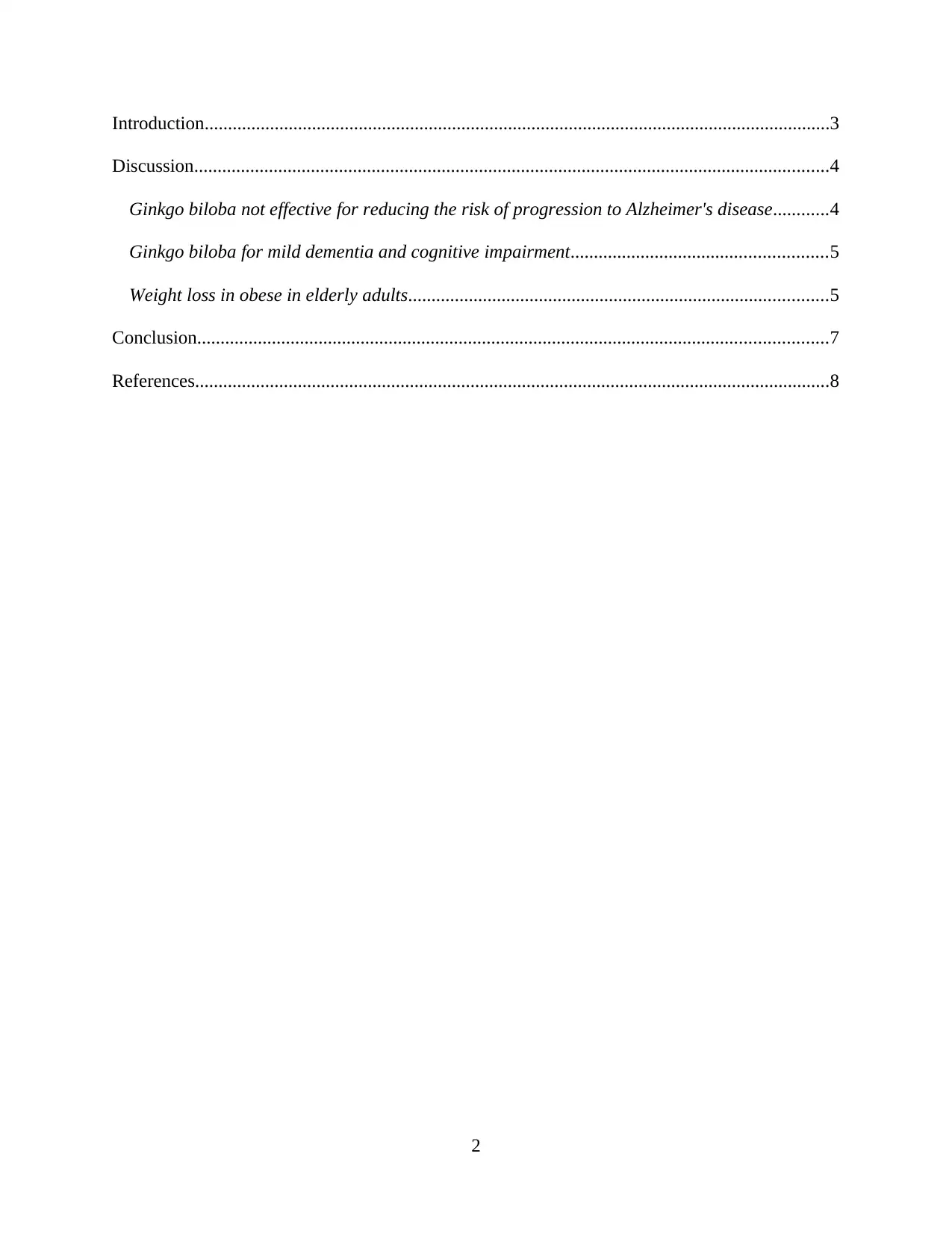
Introduction......................................................................................................................................3
Discussion........................................................................................................................................4
Ginkgo biloba not effective for reducing the risk of progression to Alzheimer's disease............4
Ginkgo biloba for mild dementia and cognitive impairment.......................................................5
Weight loss in obese in elderly adults..........................................................................................5
Conclusion.......................................................................................................................................7
References........................................................................................................................................8
2
Discussion........................................................................................................................................4
Ginkgo biloba not effective for reducing the risk of progression to Alzheimer's disease............4
Ginkgo biloba for mild dementia and cognitive impairment.......................................................5
Weight loss in obese in elderly adults..........................................................................................5
Conclusion.......................................................................................................................................7
References........................................................................................................................................8
2
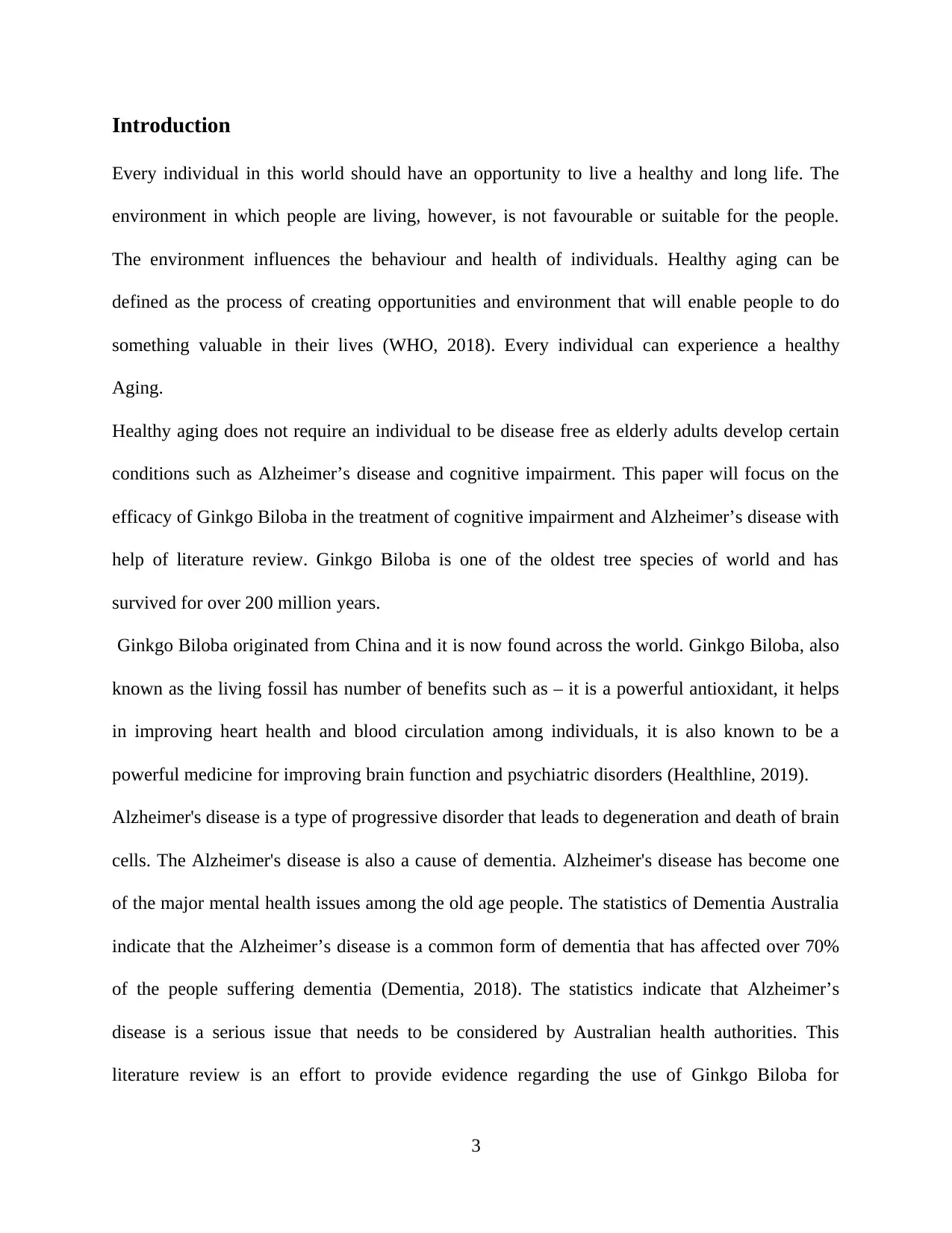
Introduction
Every individual in this world should have an opportunity to live a healthy and long life. The
environment in which people are living, however, is not favourable or suitable for the people.
The environment influences the behaviour and health of individuals. Healthy aging can be
defined as the process of creating opportunities and environment that will enable people to do
something valuable in their lives (WHO, 2018). Every individual can experience a healthy
Aging.
Healthy aging does not require an individual to be disease free as elderly adults develop certain
conditions such as Alzheimer’s disease and cognitive impairment. This paper will focus on the
efficacy of Ginkgo Biloba in the treatment of cognitive impairment and Alzheimer’s disease with
help of literature review. Ginkgo Biloba is one of the oldest tree species of world and has
survived for over 200 million years.
Ginkgo Biloba originated from China and it is now found across the world. Ginkgo Biloba, also
known as the living fossil has number of benefits such as – it is a powerful antioxidant, it helps
in improving heart health and blood circulation among individuals, it is also known to be a
powerful medicine for improving brain function and psychiatric disorders (Healthline, 2019).
Alzheimer's disease is a type of progressive disorder that leads to degeneration and death of brain
cells. The Alzheimer's disease is also a cause of dementia. Alzheimer's disease has become one
of the major mental health issues among the old age people. The statistics of Dementia Australia
indicate that the Alzheimer’s disease is a common form of dementia that has affected over 70%
of the people suffering dementia (Dementia, 2018). The statistics indicate that Alzheimer’s
disease is a serious issue that needs to be considered by Australian health authorities. This
literature review is an effort to provide evidence regarding the use of Ginkgo Biloba for
3
Every individual in this world should have an opportunity to live a healthy and long life. The
environment in which people are living, however, is not favourable or suitable for the people.
The environment influences the behaviour and health of individuals. Healthy aging can be
defined as the process of creating opportunities and environment that will enable people to do
something valuable in their lives (WHO, 2018). Every individual can experience a healthy
Aging.
Healthy aging does not require an individual to be disease free as elderly adults develop certain
conditions such as Alzheimer’s disease and cognitive impairment. This paper will focus on the
efficacy of Ginkgo Biloba in the treatment of cognitive impairment and Alzheimer’s disease with
help of literature review. Ginkgo Biloba is one of the oldest tree species of world and has
survived for over 200 million years.
Ginkgo Biloba originated from China and it is now found across the world. Ginkgo Biloba, also
known as the living fossil has number of benefits such as – it is a powerful antioxidant, it helps
in improving heart health and blood circulation among individuals, it is also known to be a
powerful medicine for improving brain function and psychiatric disorders (Healthline, 2019).
Alzheimer's disease is a type of progressive disorder that leads to degeneration and death of brain
cells. The Alzheimer's disease is also a cause of dementia. Alzheimer's disease has become one
of the major mental health issues among the old age people. The statistics of Dementia Australia
indicate that the Alzheimer’s disease is a common form of dementia that has affected over 70%
of the people suffering dementia (Dementia, 2018). The statistics indicate that Alzheimer’s
disease is a serious issue that needs to be considered by Australian health authorities. This
literature review is an effort to provide evidence regarding the use of Ginkgo Biloba for
3
⊘ This is a preview!⊘
Do you want full access?
Subscribe today to unlock all pages.

Trusted by 1+ million students worldwide
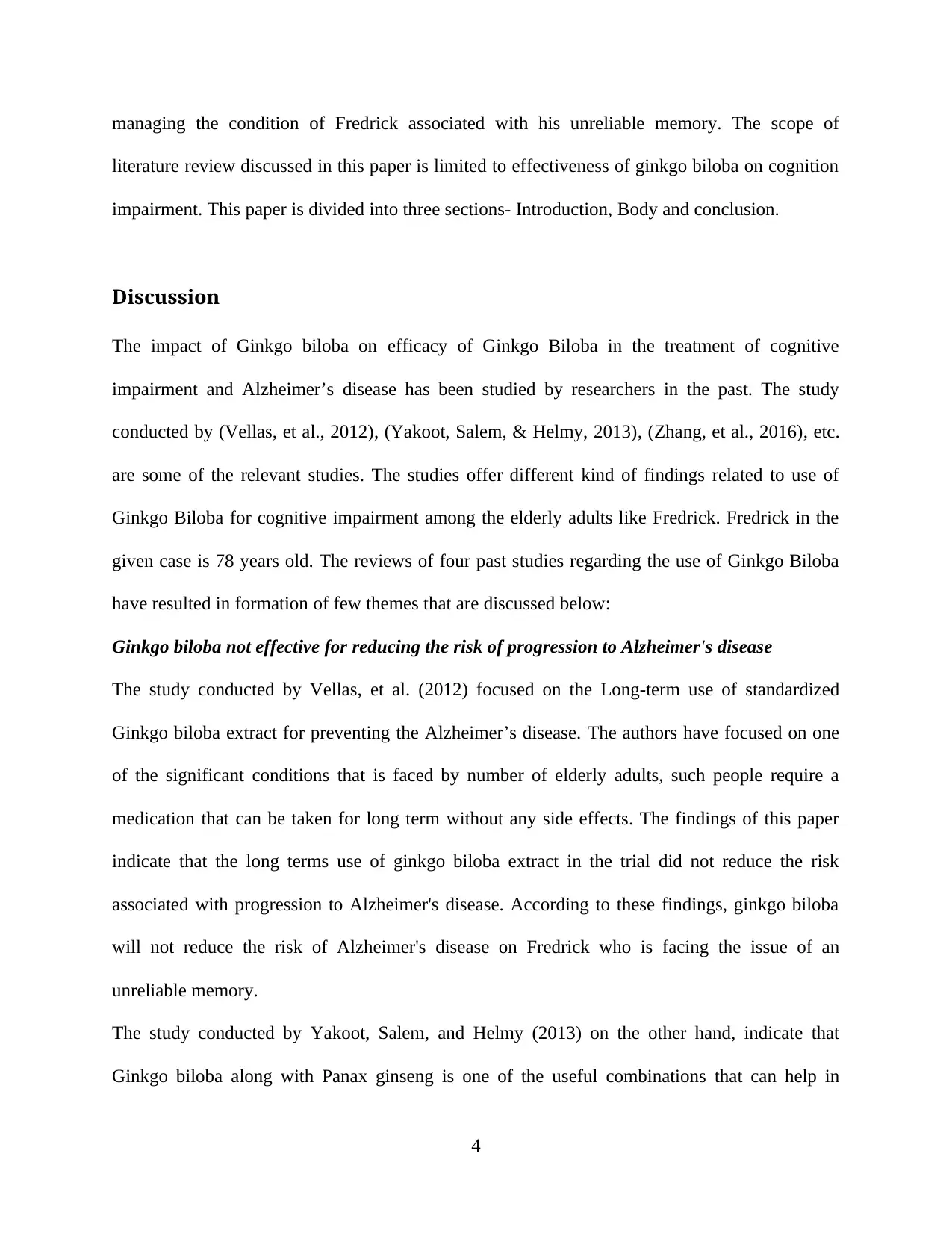
managing the condition of Fredrick associated with his unreliable memory. The scope of
literature review discussed in this paper is limited to effectiveness of ginkgo biloba on cognition
impairment. This paper is divided into three sections- Introduction, Body and conclusion.
Discussion
The impact of Ginkgo biloba on efficacy of Ginkgo Biloba in the treatment of cognitive
impairment and Alzheimer’s disease has been studied by researchers in the past. The study
conducted by (Vellas, et al., 2012), (Yakoot, Salem, & Helmy, 2013), (Zhang, et al., 2016), etc.
are some of the relevant studies. The studies offer different kind of findings related to use of
Ginkgo Biloba for cognitive impairment among the elderly adults like Fredrick. Fredrick in the
given case is 78 years old. The reviews of four past studies regarding the use of Ginkgo Biloba
have resulted in formation of few themes that are discussed below:
Ginkgo biloba not effective for reducing the risk of progression to Alzheimer's disease
The study conducted by Vellas, et al. (2012) focused on the Long-term use of standardized
Ginkgo biloba extract for preventing the Alzheimer’s disease. The authors have focused on one
of the significant conditions that is faced by number of elderly adults, such people require a
medication that can be taken for long term without any side effects. The findings of this paper
indicate that the long terms use of ginkgo biloba extract in the trial did not reduce the risk
associated with progression to Alzheimer's disease. According to these findings, ginkgo biloba
will not reduce the risk of Alzheimer's disease on Fredrick who is facing the issue of an
unreliable memory.
The study conducted by Yakoot, Salem, and Helmy (2013) on the other hand, indicate that
Ginkgo biloba along with Panax ginseng is one of the useful combinations that can help in
4
literature review discussed in this paper is limited to effectiveness of ginkgo biloba on cognition
impairment. This paper is divided into three sections- Introduction, Body and conclusion.
Discussion
The impact of Ginkgo biloba on efficacy of Ginkgo Biloba in the treatment of cognitive
impairment and Alzheimer’s disease has been studied by researchers in the past. The study
conducted by (Vellas, et al., 2012), (Yakoot, Salem, & Helmy, 2013), (Zhang, et al., 2016), etc.
are some of the relevant studies. The studies offer different kind of findings related to use of
Ginkgo Biloba for cognitive impairment among the elderly adults like Fredrick. Fredrick in the
given case is 78 years old. The reviews of four past studies regarding the use of Ginkgo Biloba
have resulted in formation of few themes that are discussed below:
Ginkgo biloba not effective for reducing the risk of progression to Alzheimer's disease
The study conducted by Vellas, et al. (2012) focused on the Long-term use of standardized
Ginkgo biloba extract for preventing the Alzheimer’s disease. The authors have focused on one
of the significant conditions that is faced by number of elderly adults, such people require a
medication that can be taken for long term without any side effects. The findings of this paper
indicate that the long terms use of ginkgo biloba extract in the trial did not reduce the risk
associated with progression to Alzheimer's disease. According to these findings, ginkgo biloba
will not reduce the risk of Alzheimer's disease on Fredrick who is facing the issue of an
unreliable memory.
The study conducted by Yakoot, Salem, and Helmy (2013) on the other hand, indicate that
Ginkgo biloba along with Panax ginseng is one of the useful combinations that can help in
4
Paraphrase This Document
Need a fresh take? Get an instant paraphrase of this document with our AI Paraphraser
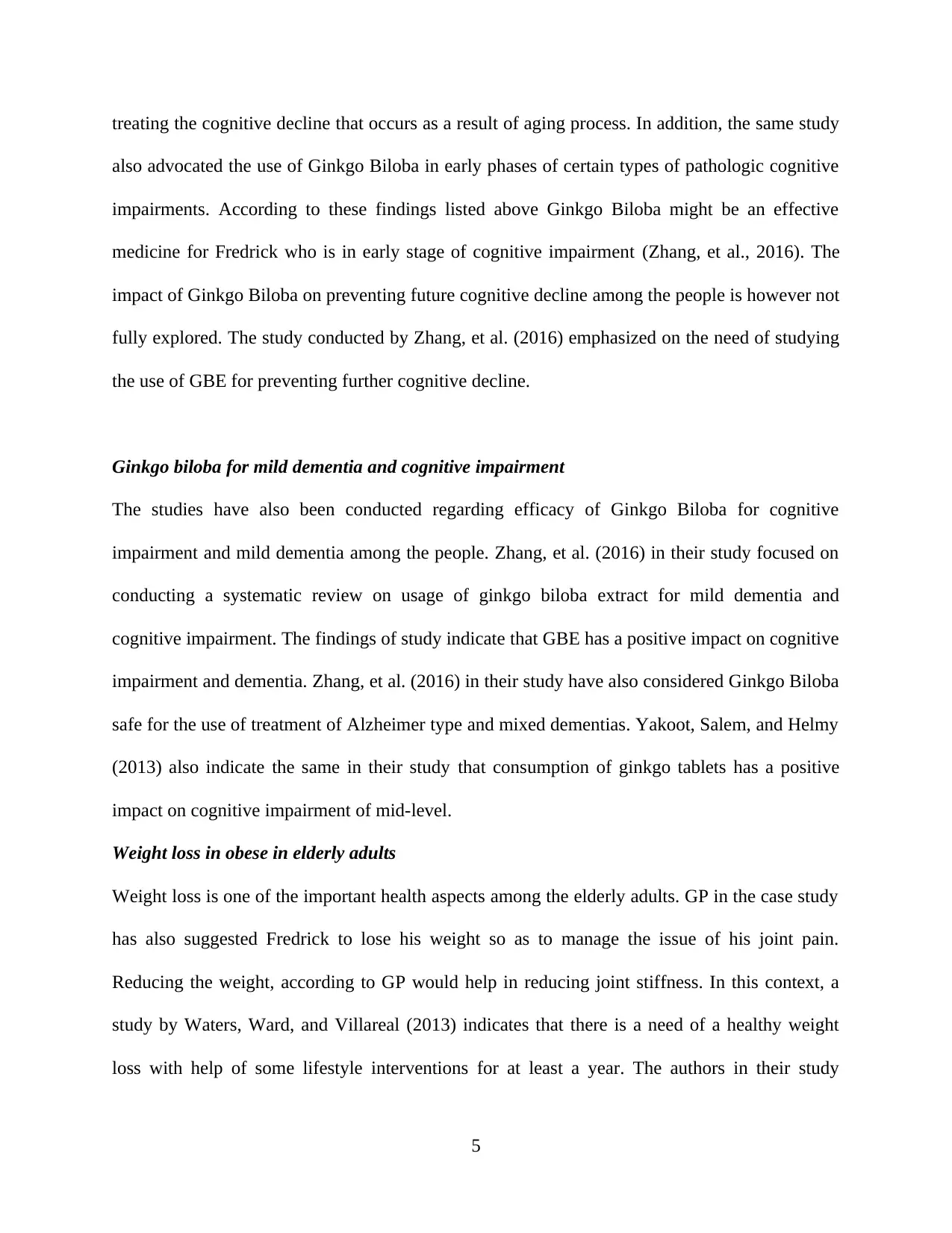
treating the cognitive decline that occurs as a result of aging process. In addition, the same study
also advocated the use of Ginkgo Biloba in early phases of certain types of pathologic cognitive
impairments. According to these findings listed above Ginkgo Biloba might be an effective
medicine for Fredrick who is in early stage of cognitive impairment (Zhang, et al., 2016). The
impact of Ginkgo Biloba on preventing future cognitive decline among the people is however not
fully explored. The study conducted by Zhang, et al. (2016) emphasized on the need of studying
the use of GBE for preventing further cognitive decline.
Ginkgo biloba for mild dementia and cognitive impairment
The studies have also been conducted regarding efficacy of Ginkgo Biloba for cognitive
impairment and mild dementia among the people. Zhang, et al. (2016) in their study focused on
conducting a systematic review on usage of ginkgo biloba extract for mild dementia and
cognitive impairment. The findings of study indicate that GBE has a positive impact on cognitive
impairment and dementia. Zhang, et al. (2016) in their study have also considered Ginkgo Biloba
safe for the use of treatment of Alzheimer type and mixed dementias. Yakoot, Salem, and Helmy
(2013) also indicate the same in their study that consumption of ginkgo tablets has a positive
impact on cognitive impairment of mid-level.
Weight loss in obese in elderly adults
Weight loss is one of the important health aspects among the elderly adults. GP in the case study
has also suggested Fredrick to lose his weight so as to manage the issue of his joint pain.
Reducing the weight, according to GP would help in reducing joint stiffness. In this context, a
study by Waters, Ward, and Villareal (2013) indicates that there is a need of a healthy weight
loss with help of some lifestyle interventions for at least a year. The authors in their study
5
also advocated the use of Ginkgo Biloba in early phases of certain types of pathologic cognitive
impairments. According to these findings listed above Ginkgo Biloba might be an effective
medicine for Fredrick who is in early stage of cognitive impairment (Zhang, et al., 2016). The
impact of Ginkgo Biloba on preventing future cognitive decline among the people is however not
fully explored. The study conducted by Zhang, et al. (2016) emphasized on the need of studying
the use of GBE for preventing further cognitive decline.
Ginkgo biloba for mild dementia and cognitive impairment
The studies have also been conducted regarding efficacy of Ginkgo Biloba for cognitive
impairment and mild dementia among the people. Zhang, et al. (2016) in their study focused on
conducting a systematic review on usage of ginkgo biloba extract for mild dementia and
cognitive impairment. The findings of study indicate that GBE has a positive impact on cognitive
impairment and dementia. Zhang, et al. (2016) in their study have also considered Ginkgo Biloba
safe for the use of treatment of Alzheimer type and mixed dementias. Yakoot, Salem, and Helmy
(2013) also indicate the same in their study that consumption of ginkgo tablets has a positive
impact on cognitive impairment of mid-level.
Weight loss in obese in elderly adults
Weight loss is one of the important health aspects among the elderly adults. GP in the case study
has also suggested Fredrick to lose his weight so as to manage the issue of his joint pain.
Reducing the weight, according to GP would help in reducing joint stiffness. In this context, a
study by Waters, Ward, and Villareal (2013) indicates that there is a need of a healthy weight
loss with help of some lifestyle interventions for at least a year. The authors in their study
5
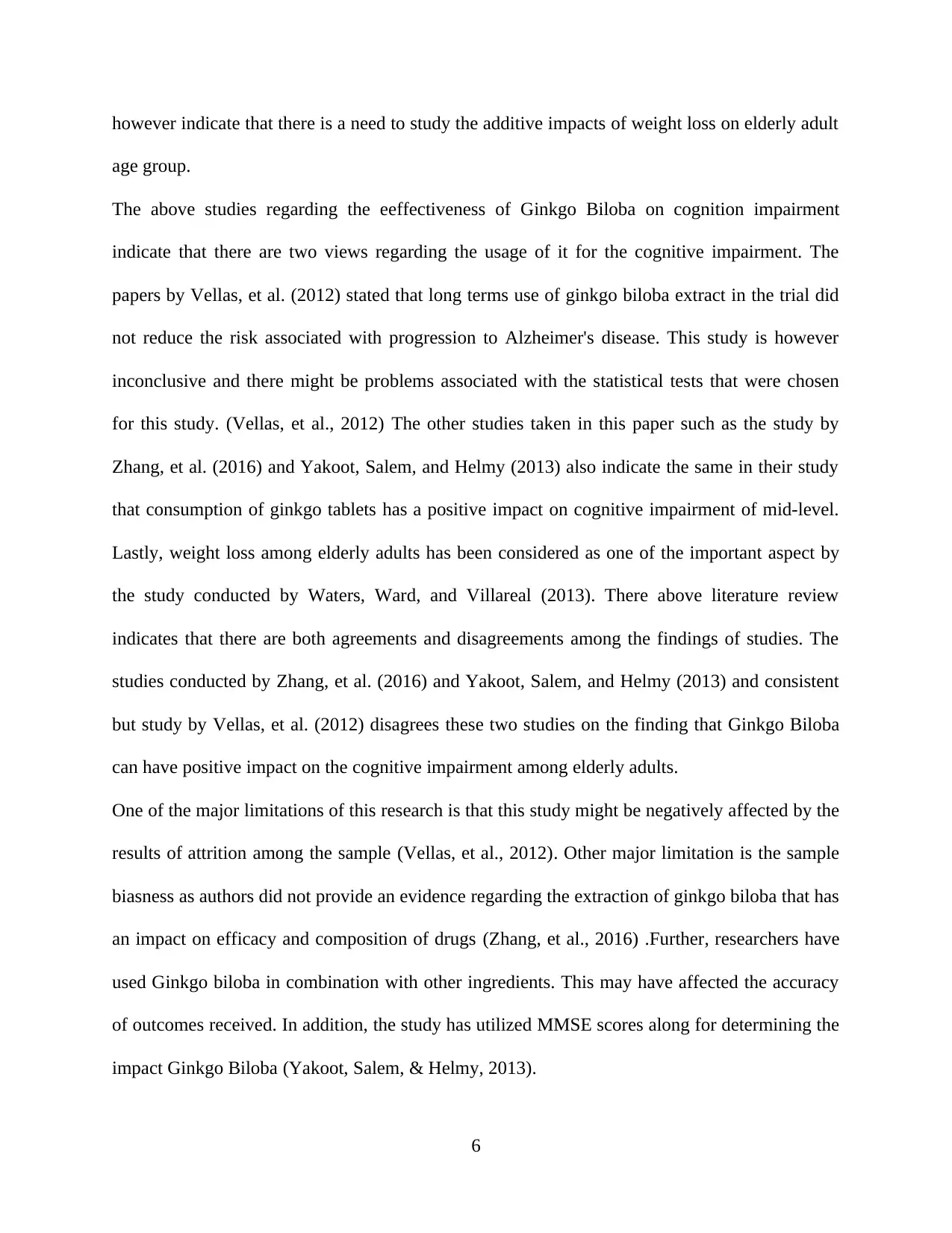
however indicate that there is a need to study the additive impacts of weight loss on elderly adult
age group.
The above studies regarding the eeffectiveness of Ginkgo Biloba on cognition impairment
indicate that there are two views regarding the usage of it for the cognitive impairment. The
papers by Vellas, et al. (2012) stated that long terms use of ginkgo biloba extract in the trial did
not reduce the risk associated with progression to Alzheimer's disease. This study is however
inconclusive and there might be problems associated with the statistical tests that were chosen
for this study. (Vellas, et al., 2012) The other studies taken in this paper such as the study by
Zhang, et al. (2016) and Yakoot, Salem, and Helmy (2013) also indicate the same in their study
that consumption of ginkgo tablets has a positive impact on cognitive impairment of mid-level.
Lastly, weight loss among elderly adults has been considered as one of the important aspect by
the study conducted by Waters, Ward, and Villareal (2013). There above literature review
indicates that there are both agreements and disagreements among the findings of studies. The
studies conducted by Zhang, et al. (2016) and Yakoot, Salem, and Helmy (2013) and consistent
but study by Vellas, et al. (2012) disagrees these two studies on the finding that Ginkgo Biloba
can have positive impact on the cognitive impairment among elderly adults.
One of the major limitations of this research is that this study might be negatively affected by the
results of attrition among the sample (Vellas, et al., 2012). Other major limitation is the sample
biasness as authors did not provide an evidence regarding the extraction of ginkgo biloba that has
an impact on efficacy and composition of drugs (Zhang, et al., 2016) .Further, researchers have
used Ginkgo biloba in combination with other ingredients. This may have affected the accuracy
of outcomes received. In addition, the study has utilized MMSE scores along for determining the
impact Ginkgo Biloba (Yakoot, Salem, & Helmy, 2013).
6
age group.
The above studies regarding the eeffectiveness of Ginkgo Biloba on cognition impairment
indicate that there are two views regarding the usage of it for the cognitive impairment. The
papers by Vellas, et al. (2012) stated that long terms use of ginkgo biloba extract in the trial did
not reduce the risk associated with progression to Alzheimer's disease. This study is however
inconclusive and there might be problems associated with the statistical tests that were chosen
for this study. (Vellas, et al., 2012) The other studies taken in this paper such as the study by
Zhang, et al. (2016) and Yakoot, Salem, and Helmy (2013) also indicate the same in their study
that consumption of ginkgo tablets has a positive impact on cognitive impairment of mid-level.
Lastly, weight loss among elderly adults has been considered as one of the important aspect by
the study conducted by Waters, Ward, and Villareal (2013). There above literature review
indicates that there are both agreements and disagreements among the findings of studies. The
studies conducted by Zhang, et al. (2016) and Yakoot, Salem, and Helmy (2013) and consistent
but study by Vellas, et al. (2012) disagrees these two studies on the finding that Ginkgo Biloba
can have positive impact on the cognitive impairment among elderly adults.
One of the major limitations of this research is that this study might be negatively affected by the
results of attrition among the sample (Vellas, et al., 2012). Other major limitation is the sample
biasness as authors did not provide an evidence regarding the extraction of ginkgo biloba that has
an impact on efficacy and composition of drugs (Zhang, et al., 2016) .Further, researchers have
used Ginkgo biloba in combination with other ingredients. This may have affected the accuracy
of outcomes received. In addition, the study has utilized MMSE scores along for determining the
impact Ginkgo Biloba (Yakoot, Salem, & Helmy, 2013).
6
⊘ This is a preview!⊘
Do you want full access?
Subscribe today to unlock all pages.

Trusted by 1+ million students worldwide
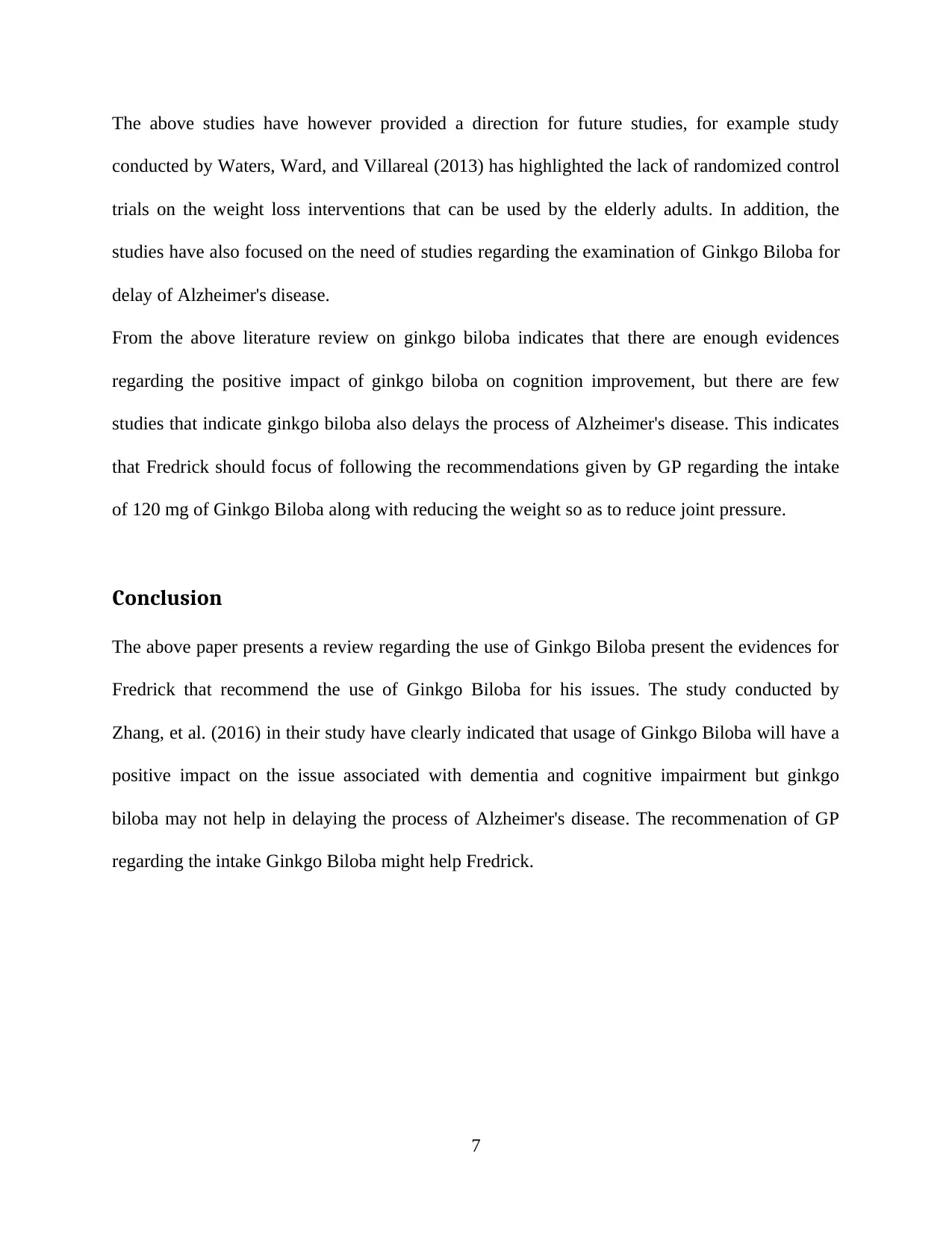
The above studies have however provided a direction for future studies, for example study
conducted by Waters, Ward, and Villareal (2013) has highlighted the lack of randomized control
trials on the weight loss interventions that can be used by the elderly adults. In addition, the
studies have also focused on the need of studies regarding the examination of Ginkgo Biloba for
delay of Alzheimer's disease.
From the above literature review on ginkgo biloba indicates that there are enough evidences
regarding the positive impact of ginkgo biloba on cognition improvement, but there are few
studies that indicate ginkgo biloba also delays the process of Alzheimer's disease. This indicates
that Fredrick should focus of following the recommendations given by GP regarding the intake
of 120 mg of Ginkgo Biloba along with reducing the weight so as to reduce joint pressure.
Conclusion
The above paper presents a review regarding the use of Ginkgo Biloba present the evidences for
Fredrick that recommend the use of Ginkgo Biloba for his issues. The study conducted by
Zhang, et al. (2016) in their study have clearly indicated that usage of Ginkgo Biloba will have a
positive impact on the issue associated with dementia and cognitive impairment but ginkgo
biloba may not help in delaying the process of Alzheimer's disease. The recommenation of GP
regarding the intake Ginkgo Biloba might help Fredrick.
7
conducted by Waters, Ward, and Villareal (2013) has highlighted the lack of randomized control
trials on the weight loss interventions that can be used by the elderly adults. In addition, the
studies have also focused on the need of studies regarding the examination of Ginkgo Biloba for
delay of Alzheimer's disease.
From the above literature review on ginkgo biloba indicates that there are enough evidences
regarding the positive impact of ginkgo biloba on cognition improvement, but there are few
studies that indicate ginkgo biloba also delays the process of Alzheimer's disease. This indicates
that Fredrick should focus of following the recommendations given by GP regarding the intake
of 120 mg of Ginkgo Biloba along with reducing the weight so as to reduce joint pressure.
Conclusion
The above paper presents a review regarding the use of Ginkgo Biloba present the evidences for
Fredrick that recommend the use of Ginkgo Biloba for his issues. The study conducted by
Zhang, et al. (2016) in their study have clearly indicated that usage of Ginkgo Biloba will have a
positive impact on the issue associated with dementia and cognitive impairment but ginkgo
biloba may not help in delaying the process of Alzheimer's disease. The recommenation of GP
regarding the intake Ginkgo Biloba might help Fredrick.
7
Paraphrase This Document
Need a fresh take? Get an instant paraphrase of this document with our AI Paraphraser
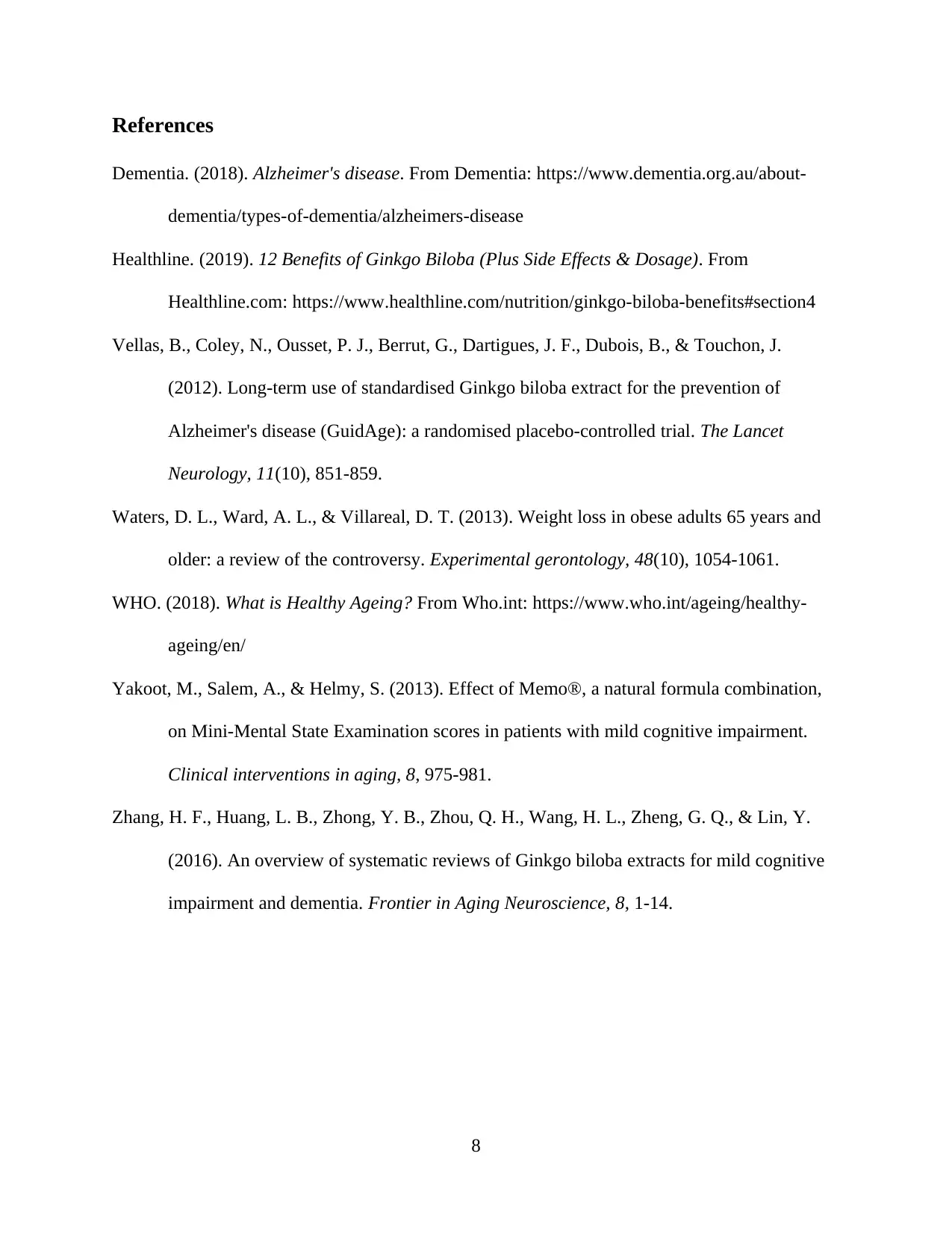
References
Dementia. (2018). Alzheimer's disease. From Dementia: https://www.dementia.org.au/about-
dementia/types-of-dementia/alzheimers-disease
Healthline. (2019). 12 Benefits of Ginkgo Biloba (Plus Side Effects & Dosage). From
Healthline.com: https://www.healthline.com/nutrition/ginkgo-biloba-benefits#section4
Vellas, B., Coley, N., Ousset, P. J., Berrut, G., Dartigues, J. F., Dubois, B., & Touchon, J.
(2012). Long-term use of standardised Ginkgo biloba extract for the prevention of
Alzheimer's disease (GuidAge): a randomised placebo-controlled trial. The Lancet
Neurology, 11(10), 851-859.
Waters, D. L., Ward, A. L., & Villareal, D. T. (2013). Weight loss in obese adults 65 years and
older: a review of the controversy. Experimental gerontology, 48(10), 1054-1061.
WHO. (2018). What is Healthy Ageing? From Who.int: https://www.who.int/ageing/healthy-
ageing/en/
Yakoot, M., Salem, A., & Helmy, S. (2013). Effect of Memo®, a natural formula combination,
on Mini-Mental State Examination scores in patients with mild cognitive impairment.
Clinical interventions in aging, 8, 975-981.
Zhang, H. F., Huang, L. B., Zhong, Y. B., Zhou, Q. H., Wang, H. L., Zheng, G. Q., & Lin, Y.
(2016). An overview of systematic reviews of Ginkgo biloba extracts for mild cognitive
impairment and dementia. Frontier in Aging Neuroscience, 8, 1-14.
8
Dementia. (2018). Alzheimer's disease. From Dementia: https://www.dementia.org.au/about-
dementia/types-of-dementia/alzheimers-disease
Healthline. (2019). 12 Benefits of Ginkgo Biloba (Plus Side Effects & Dosage). From
Healthline.com: https://www.healthline.com/nutrition/ginkgo-biloba-benefits#section4
Vellas, B., Coley, N., Ousset, P. J., Berrut, G., Dartigues, J. F., Dubois, B., & Touchon, J.
(2012). Long-term use of standardised Ginkgo biloba extract for the prevention of
Alzheimer's disease (GuidAge): a randomised placebo-controlled trial. The Lancet
Neurology, 11(10), 851-859.
Waters, D. L., Ward, A. L., & Villareal, D. T. (2013). Weight loss in obese adults 65 years and
older: a review of the controversy. Experimental gerontology, 48(10), 1054-1061.
WHO. (2018). What is Healthy Ageing? From Who.int: https://www.who.int/ageing/healthy-
ageing/en/
Yakoot, M., Salem, A., & Helmy, S. (2013). Effect of Memo®, a natural formula combination,
on Mini-Mental State Examination scores in patients with mild cognitive impairment.
Clinical interventions in aging, 8, 975-981.
Zhang, H. F., Huang, L. B., Zhong, Y. B., Zhou, Q. H., Wang, H. L., Zheng, G. Q., & Lin, Y.
(2016). An overview of systematic reviews of Ginkgo biloba extracts for mild cognitive
impairment and dementia. Frontier in Aging Neuroscience, 8, 1-14.
8
1 out of 8
Related Documents
Your All-in-One AI-Powered Toolkit for Academic Success.
+13062052269
info@desklib.com
Available 24*7 on WhatsApp / Email
![[object Object]](/_next/static/media/star-bottom.7253800d.svg)
Unlock your academic potential
Copyright © 2020–2026 A2Z Services. All Rights Reserved. Developed and managed by ZUCOL.





